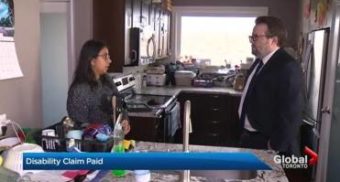About the Show
The Disability Law Show is Canada’s only long-term disability law show on TV and radio devoted to combating the myths surrounding disability law and personal injury law and explaining how to beat insurance companies at their own game.
Airing weekly in Ontario, Alberta, and British Columbia, but relevant to all Canadian provinces (excluding Quebec), the Disability Law Show is hosted by disability lawyer Sivan Tumarkin, who uses his past experience working for insurance companies to force them to pay what they owe.
Don’t miss a minute of the long-term disability show that insurance companies don’t want you to watch!
Long term disability denied in Canada?
Contact Sivan’s disability law team at 1-855-821-5900, email Help@DisabilityRights.ca, or contact us online.
Past Episodes

Television
Watch the Disability Law Show on television stations across Ontario, Alberta and British Columbia! Experience one of the latest episodes or subscribe to our firm’s YouTube channel to access our entire legal library.

Radio
Hear the lawyers at Samfiru Tumarkin LLP on the Disability Law Show, airing online and on seven radio stations across Canada! Catch up on past episodes in Ontario or recent shows in Western Canada.
Showtimes
When to watch
- Ontario
- Saturdays: 9:30 a.m. ET on CTV Toronto • 12 p.m. ET on Global
- Sundays: 8:30 a.m. ET on Global
- Alberta
- Sundays: 12 p.m. MT on Global
- B.C.
- Saturdays: 10:30 a.m. PT on CTV Vancouver • 1 p.m. PT on Global BC
- Sundays: 1:30 p.m. PT on Global BC
When to listen
- Ontario
- Fridays: 6:30 p.m. ET on 640 Toronto & 980 CFPL (London)
- Saturdays: 11 a.m. ET on 640 Toronto • 1 p.m. ET on Newstalk 1010 (Toronto)
- Sundays: 12 p.m. ET on 640 Toronto
- Alberta
- Saturdays: 5 p.m. MT on QR Calgary & 630 CHED (Edmonton)
- B.C.
- Saturdays: 4 p.m. PT on 980 CKNW (Vancouver)
Our Cases in the News
Some of Canada’s largest media outlets have profiled our clients’ battle against their insurance company. Learn more about their experiences, and how our firm obtained results.

Sandra Bullock vs. Sun Life — Standing Up for Disability Rights in Canada
Sun Life denied Sandra Bullock’s LTD benefits for caring for her disabled son. Samfiru Tumarkin LLP took action—her coverage was reinstated.

Abused Barrie teacher secures legal victory in LTD benefits case
A Barrie teacher was assaulted by a student and suffered an injury. Despite her doctor's support, her insurance provider cut off her…

Mitch Murphy’s Fight for Justice
Paralyzed student Mitch Murphy was denied benefits by his insurer. Samfiru Tumarkin LLP is fighting for justice and full compensation.
Areas Served in Canada
Our team of experienced disability lawyers can help individuals in all Canadian provinces (excluding Quebec) when their long-term disability benefits are denied or cut off.
Alberta • British Columbia • Manitoba • New Brunswick • Newfoundland & Labrador • Nova Scotia • Ontario • P.E.I. • Saskatchewan














